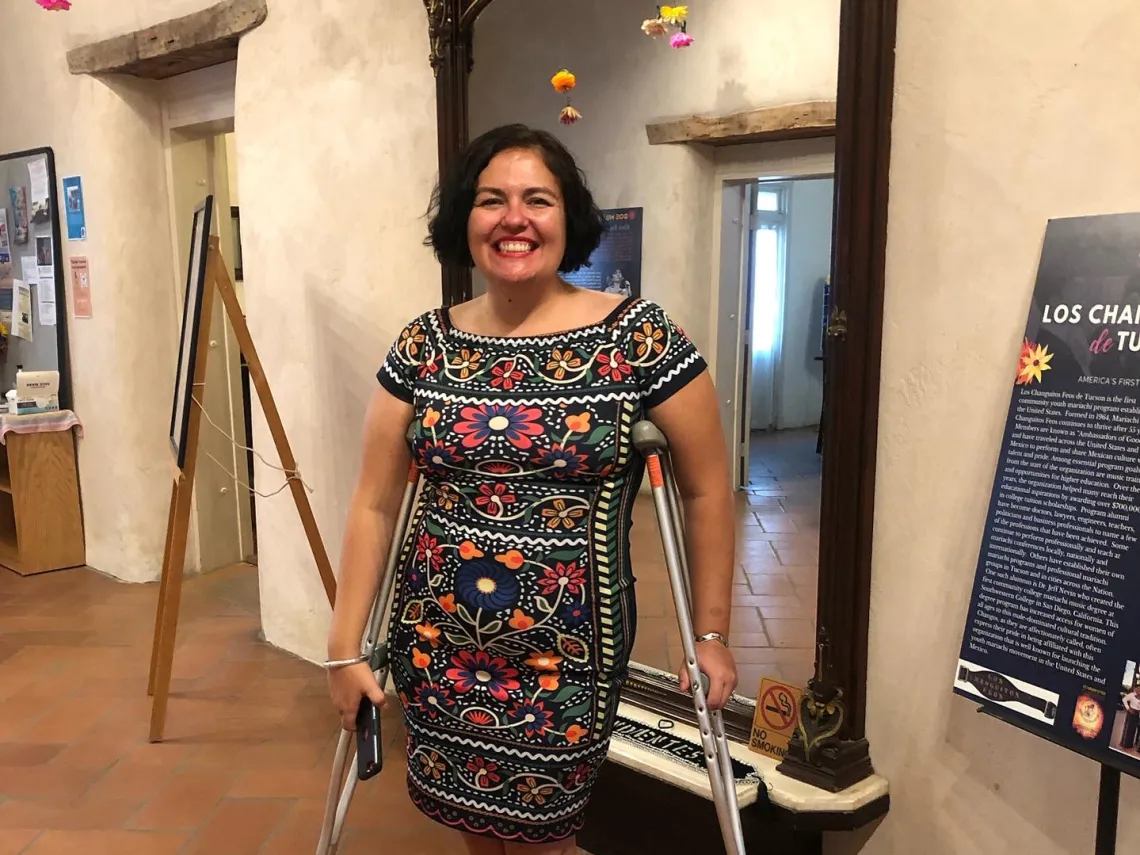Q&A with Alumna Alisha Vasquez, Historian and Activist

A first-generation student and fifth-generation Tucsonense, Alisha Vasquez graduated with degrees in both history and gender and women’s studies from the University of Arizona.
Alisha, who self describes as a crip Chicana, works at the Southwest Folklife Alliance and is co-director of the Mexican American Heritage and History Museum in Tucson at the Historic Sosa-Carrillo House. She’s also a member of the National Coalition for Latinxs with Disabilities and was a presenter in the College of Social and Behavioral Sciences’ recent JEDI Academy on Disability Justice.
Why did you major in history and gender and women’s studies at the University of Arizona and how did it help prepare you for your career?
I got to the UA knowing I wanted to study history. I accidentally got into women’s studies.
I’m disabled, and the golf cart picking me up for my very first class was late, so I was late. I was so mortified that I dropped the class. I added “Intro to LGBTQ Studies,” and that was my introduction to gender and women’s studies, which at the time was just women’s studies. We read Audre Lorde’s Zami, and, for me, that was the first time I saw a queer, disabled, woman of color really claim it all.
I love history, but it was the gender and women’s studies classes that kept me in college, quite frankly. I took a summer class with Kathleen Powers, who was a graduate assistant in gender and women’s studies, and she introduced me to disability studies, which I had no idea existed. I didn’t know that you could have pride in being disabled. That led me to the path of understanding Chicana feminism, disability, and how these social movements have existed within the United States boundaries.
What was your career trajectory after graduation?
After undergrad, I got a job teaching middle school at Paulo Freire Freedom School for three years, which was my boot camp for learning how to teach. Then I went to San Francisco State for grad school. I went there to study with Paul Longmore, who’s one of the founders of disability history in the United States. Two weeks after I moved there, Paul died unexpectedly. This brought me back to looking at Chicana feminism from more of a disabled lens.
After I graduated, I decided that I needed to come home to Tucson. I returned in fall of 2012, and I worked at Skrappy’s, which was a punk rock club. I was also doing real passion projects, including border justice work and calling out sexism within social movements. I taught at Pima Community College and Earlham College’s Border Studies Program.
Then I became a parent and the pandemic happened, so I wasn't working for about two years. I started working very part-time for the Southwest Folklife Alliance doing their social media, which blossomed into a larger role in communications and as an accessibility consultant. This accessibility position is about incorporating the community's ideas. I think that's something I learned from my time at the UA as an undergrad. I worked closely with Liz Kennedy and Sandy Soto, and those two are such powerhouses in terms of showing me how to authentically and reciprocally communicate and connect with the community.
At the beginning of this year, I was also appointed the co-director of the Mexican American Heritage and History Museum in Tucson. That's just been a really beautiful way to work with elders in the community. Our recent exhibit “Dos Mujeres Tucsonenses” on Alva Bustamante Torres and Linda Ronstadt honors these two women with deep roots in Tucson and was really a labor of love.
What advice would you give to someone who has just graduated and is pursuing a career?
Persistence and knowing who you are and not being afraid to make mistakes and apologize. When I returned to Tucson after getting my master's, I thought I was going be able to do anything I wanted. But we were in a recession and there weren't a ton of jobs that fit with my moral compass. And that, I think, is another thing that I got from my time at SBS – it solidified my moral compass and taught me to synthesize all the available information to make decisions.
And I would say learn to go with the flow a little bit. You can't plan for everything. The less energy you put into this idea of perfection and the more energy you put into yourself and your community, I think it just comes back to you. And it might come back in ways that you had not expected, for example, running a museum!

